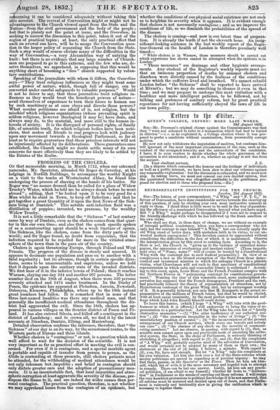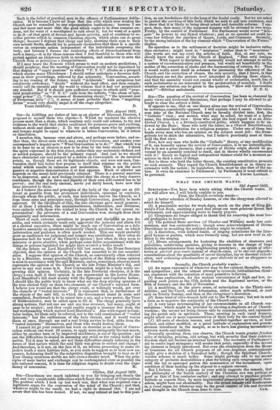REPRESENTATIVE INSTITUTIONS FOR TTIE CHURCH.
London, 23d August 1862. Sra—The letters of your correspondents "A Whig" and "F. T. C.," in favour of Convocation, have done considerable service towards the clearing up of this question, if only by eliciting your own most instructive remarks in reply to them. I think there is little more to be said in the way of question- ing the efficiency of a reanimated Convocation, beyond what you have urged. But "A Whig " might perhaps be disappointed if I were not to respond to the friendly-challenge with which he has followed up the frank assertion of his own views.
Who shall say that, in these days of change, we are without an example of intrepid political consistency, when you have a correspondent who not
only has the courage to sign himself "A Whig," but can actually apply the old Whig creed of better days, with unshaken faith in its virtue, to our un- wonted modern emergencies ? This devotion cannot be appreciated without considering the difficulties in the face of which it is maintained. Observe the interpretation given by this creed to existing facts. According to it, the State is not, the Church is, "given up to the violence of oratorical dema- gogues, the oppression of overbearing and insolent rulers." (Those imperti- nent cries of "Name, name !" will of course be treated by Constitutional Whig. with the contempt due to such Radical personality. In view of so conspicuous a fact as the blessed exemption of the State m those demo- cratacal and tyrannical miseries to which the unhappy Church is a pitiable victim, what Churchman will not rush to that sanctuary of constitutional representation in which calm and reasonable liberty is enshrined ? Accord- ing to this creed, again, Louis Blanc and the French President conspire with the Northern Powers in "patronizing contempt for constitutional govern- ment." Wanting the clue of this venerable creed, mere undisciplined ob- servation has supposed that the French demagogues, President and the rest, had practically reduced the theory of representation ad absurdum, not by Hyperborean contempt of the great Whig idol, but by extravagant worship of it. It is generally believed, not only that M. Bonaparte is the actual re- presentative of the millions of French voters, but that he would be elected, with at least equal unanimity, by the most perfect system of restricted suf- frage which Lord John Russell himself could devise. To leave this banter, (which I hope "A Whig" will take with the good- humour in which it is offered,) I will endeavour to bring the value of re- presentation to a particular test. Let the Whig take his own list of "fatally obstructive anomalies "—(1)." The utter inefficiency of our cathedral sys- tem" - (2) "the enormous inequality in the value of livings" ; (3) "the unsatisfactory position of curates" ; (4) "the inconveniences of the present arrangement of our Church services, which every one bewails and nobody can cure" ; (5) "the absence of any check on the morality of commons- eating members." Let me observe, in passing, with regard to (1), that, as sensible men cannot agree upon any practicable mode of amending the cathe- dral system., the State, in Om shape of Parliament, is seriously, thinking of abolishing it altogether; with regard to (2), (3), and (4), that the complaints of "A Whig" will probably surprise most of the advocates of Convocation, and would certainly, not be adopted by many of them as their own; • the statement at the end of (4) being, I believe, a mistake. With regard to .(5), you Sir, have said enough. But let "A Whig" take his complaints at his own valuation. Let him also look over a list of the State-reforms which secular politicians are agreed in regarding as of peculiar urgency : he may find them, passim, in the Spectator or the Times. Then let him ask him- self, which list of evils it is the more necessary and hopeful task to attempt to remedy. There can be but one answer. Lastly, let him ask any practi- cal politician (I am afraid to say himself,) whether he looks to " delibera- tion ' in Parliament as the means of carrying out those reforms. I will resign the very humblest pretensions to political knowledge if it be not answered, that all reforms must be matured and decided upon out of doors, and that Parlia- ment is ruinously and intolerably slow in giving the ratification which is necessary to legalize them;
Such is the belief of practical men in the efficacy of Parliamentary delibe- ration. It is because I have no hope that the evils which now weaken the Church can be remedied by any representative institutions ; because I see and feel more and more that the good which ought to be done remains un- done, not for want of a mouthpiece to talk about it, but for want of a spirit to do it—of that spirit of devout and heroic activity, and of readiness to sa- crifice private selfish to common Christian objects, which alone can do great things ; because I deplore that clergy and laity, shutting their eyes to their own several faults, should try to persuade themselves that there is a specific virtue in corporate action independent of the individuals composing the body, and because I foresee the deadening effects of disenchantment from such a fancy,—it is for these reasons that I feel thankful to those who will protest against an idolatrous faith in mechanism, and endeavour to save the Church from so pernicious a disappointment.
If I may brave the Nemesis which seems to wait on modern predictions, I should prophesy, that the meeting of Convocation would not be signalized by that display of "angry passions" to which "F. T. C." alludes as a prospect which alarms many Churchmen : I should rather anticipate a decorous dull- ness in their proceedings, relieved by due solemnity. Convocation, accord- ing to my reading of the future, would "deliberate" with scrupulous but considerate orthodoxy, "decide" without the least effect, and then compla- cently call its enemies and the world to witness that it had not perpetrated any scandal. But if it should gain sufficient courage to attack such "prac- tical perplexities" as "F. T. C." culls from the infinite, "the abuse of epis- copal power" (!), "the excesses of Romanizing clergy," "the ignorant zeal of Protestant laity" (! !), it seems at least probable that these "impelling forces" would very shortly impel it off the stage altogether.



























 Previous page
Previous page